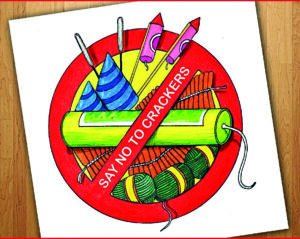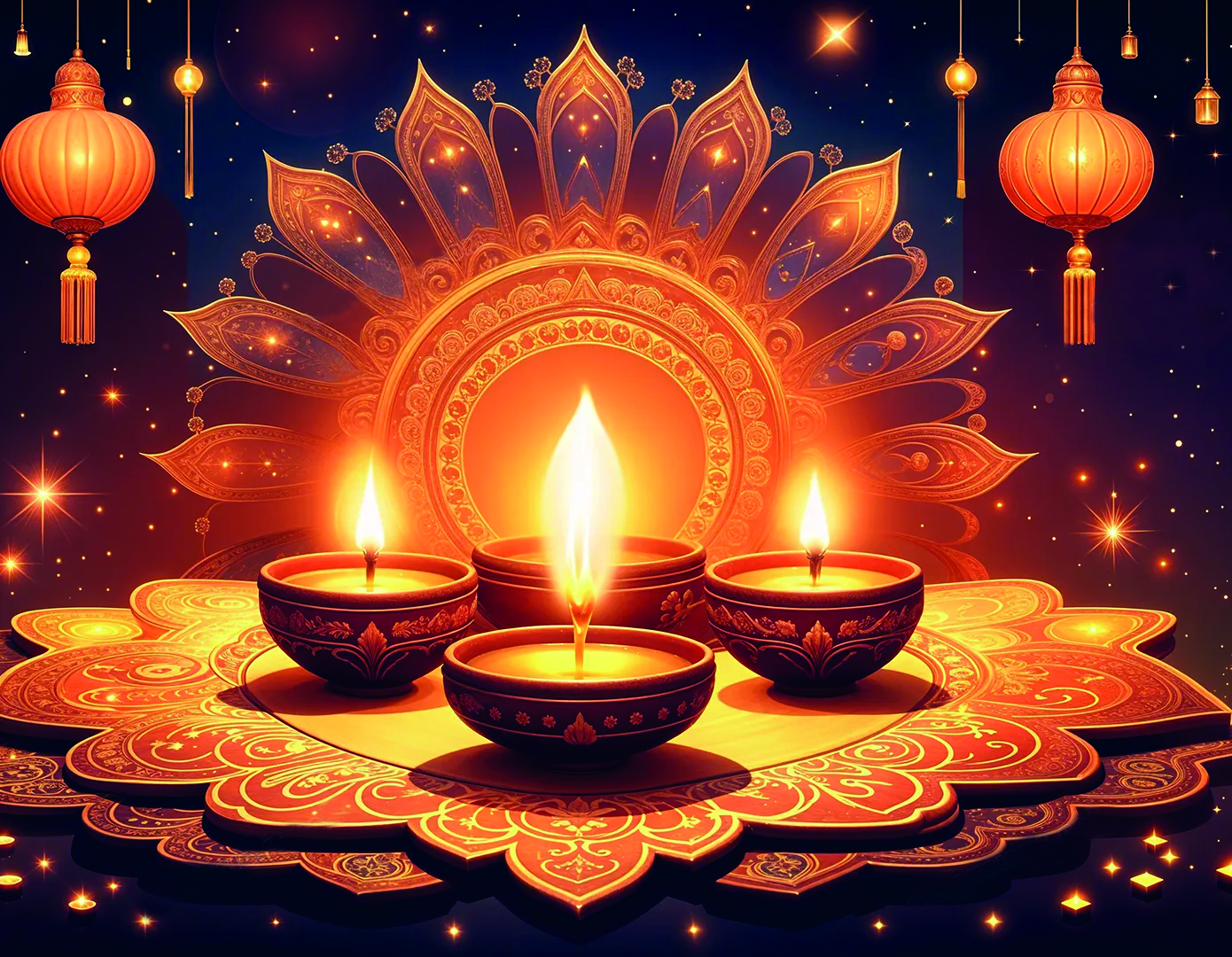 Diwali is the five-day festival of light, celebrated by millions worldwide. The festival coincides with the Hindu New Year and thus also celebrates new beginnings and the triumph of good over evil and light over darkness. Diwali also commemorates Lakshmi, the Divinity of wealth and prosperity. In fact, the 5-day festivity begins with Dhanteras (the day of good fortune), followed by Naraka Chaturdasi (the day of knowledge and also the day Goddess Kaali destroys the demon of ignorance Narakasura), followed by Diwali (the day of light), followed by Annakut (meaning mountain of food and celebrated as the New Year’s Day) and finally, Bhai Duj (the day to celebrate sibling love).
Diwali is the five-day festival of light, celebrated by millions worldwide. The festival coincides with the Hindu New Year and thus also celebrates new beginnings and the triumph of good over evil and light over darkness. Diwali also commemorates Lakshmi, the Divinity of wealth and prosperity. In fact, the 5-day festivity begins with Dhanteras (the day of good fortune), followed by Naraka Chaturdasi (the day of knowledge and also the day Goddess Kaali destroys the demon of ignorance Narakasura), followed by Diwali (the day of light), followed by Annakut (meaning mountain of food and celebrated as the New Year’s Day) and finally, Bhai Duj (the day to celebrate sibling love).
Diwali is derived from the word ‘Deepavali’, which means a row of lights. Hindus light rows of traditional clay oil lamps outside their homes to symbolize the victory of light over darkness and knowledge over ignorance. In fact, in almost every religion we find the duality of light and darkness personifying good and evil, or order and chaos respectively. While darkness invokes fear and anxiety, light offers hope and protection.
Significance of Lighting Lamps
The most common icon which captures the spirit of Diwali is the oil lamp, lighting up millions of homes and establishments with joy and hope. Indeed, the only way to negate darkness is with light and the only way to dispel evil is through thoughts, words and deeds that are good. Darkness will only consume darkness and deepen. Darkness can only be dispelled with light and evil can only be driven out with goodness. Evil cannot and will not be vanquished with evil. The theory of ‘an eye for an eye’ will only make the world blind. In the words of Seth Adam Smith in Rip Van Winkle and the Pumpkin Lantern: “You cannot defeat darkness by running from it, Nor can you conquer your inner demons by hiding them from the world. In order to defeat the darkness, you must bring it into the light.”
Symbolism of Light
In diverse cultures and civilizations, light has also been associated with Divinity. Zoroastrians associate light with life and Meher Yazata is seen as the Divinity of light. Like Diwali, Zoroastrians observe Mehergan which also commemorates the victory of light over the forces of darkness and good over the forces of evil. Zoroastrians also light oil lamps at home and at offices and not just on festive days, but, every day. In a sense, Zoroastrians celebrate light every single day be it while praying the Meher Yasht (hymn) or the Meher Niyaish (litany) to sunlight or while praying before a consecrated fire or a hearth fire at home.
In Hinduism, light symbolizes Brahman – the uncreated, eternal, infinite, transcendent, and all-embracing principle. Brahman contains in itself both being and non-being, and it is the sole reality — the ultimate cause, foundation, source, and goal of all existence. In Buddhism, light symbolizes the attainment of understanding and enlightenment, which involves transcending the illusion of a separate self, leading to a deeper comprehension of existence and interconnectedness.
According to the Holy Bible, the primary utterance of creation is ‘Let there be light,’ followed by its separation from darkness. The opening paragraph in the Old Testament (The Book of Genesis) states: “In the beginning God created the heavens and the earth. Now the earth was formless and empty, darkness was over the surface of the deep, and the Spirit of God was hovering over the waters. And God said, ‘Let there be light,’ and there was light. God saw that the light was good and he separated the light from the darkness.” Thus, light serves as a symbol of all that is good, creative and beautiful.
Celebrate Responsibly
Diwali is essentially a festival of light, which unfortunately has become a festival of noise and other forms of pollution. Why can’t Diwali (the festival of light and colour) be celebrated with lighting of oil lamps, lanterns and a display of rangoli? Must we literally blow up money in smoke with the use of noisy and harmful firecrackers?
As a community, we love to celebrate. Not just our own feasts and festivals, even Diwali and Christmas are celebrated with equal gusto. However, often in our enthusiasm, we end up violating certain fundamental precepts of our own religion. Take for example the misuse of firecrackers during the festival of Diwali. Not only are firecrackers a source of air and sound pollution, but from a Zoroastrian point of view, an instrument of abusing fire. Surveys and studies indicate that during Diwali, sound pollution far exceeds decibels that humans and animals can tolerate. Year after year it traumatizes animals, especially dogs, which we as a community love. There are also old and sick persons whose stress levels shoot up drastically during Diwali. Those with respiratory problems are often forced to leave the city. Those who stay back suffer untold agony. Diwali is also the time when hospitals record more casualties. Cases of accidental fires also shoot up during this period.
From a Zoroastrian perspective, anything that endangers life, health or property is considered as druj (negative), from which one must stay away. Sadly, far from staying away, there are Zoroastrian associations in Bombay and other towns and cities which organize formal functions for perpetuating air and sound pollution!
Make A Difference
Let us attempt this year to celebrate Diwali with a difference. Let us spread light and cheer with the lighting of lamps, both in our homes and in our hearts. Let us resolve to spread the light of love and the light of knowledge. Let us light up a smile on the face of one who is poor, needy, lonely or sick. This would be celebrating Diwali in the right spirit.
Let us resolve to abstain from bringing discomfort to others with misuse of firecrackers. For a festival that promotes peace, the use of firecrackers is an instrument of violence. Instead of blowing up money in smoke let us use it to light the lamp of peace, education, good health and prosperity for all.This Festival of Lights, let us attempt to become the light that will en-liven and en-lighten lives that we will touch with our good thoughts, words and deeds.
- Celebrate Navruz 2025 With The Spirit Of Excellence And Wholesomeness - 15 March2025
- Celebrating Women And Equality - 8 March2025
- How The Greeks Viewed Ancient Persians - 1 March2025
